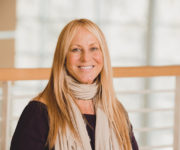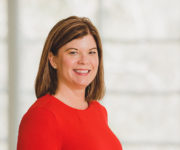Meet the Match
A Kazakh Woman with a Vision for Empowerment and Social Change
Meruyert Tlebaldy came into the world with a will to overcome. Born with cerebral palsy in a post-Soviet Kazakhstan struggling through economic crisis, doctors predicted she would neither walk nor eat. The situation was grave enough that nine months after her birth doctors at the hospital told her parents to leave her there and move on with their lives.
Her parents, however, didn’t hesitate. They brought Meruyert, or “Mika” as she prefers, home and gave her every opportunity to thrive. Even though she only learned to walk at 6 years old, her mother took her to the swimming pool with safety floats. Her parents even brought her to an equestrian club, until she injured herself falling off a horse.
“After that, my father said no more horses,” Mika recalls, laughing. “My mother and father always put a big effort into me. They cried when I finished university. They cried when I went to Rio for the Paralympics. They are happy with every one of my successes.”
Raised in Semey, Mika moved to Almaty, Kazakhstan’s largest metropolis, after secondary school to attend KIMEP University, where she earned her bachelor’s degree in business economics with a minor in public policy economics.
At university, Mika was exercising in the gym one day when she was approached by a man named Artur, a Paralympic trainer looking for women to join his powerlifting team. Mika searched online for information on female powerlifters and ultimately declined the invitation. The sport wasn’t for her. But, she was interested in this movement Artur mentioned to her: the Paralympics.
While looking for work following graduation, Mika saw an advertisement for remote worker positions with the Kazakhstan Paralympic Committee and applied. She was hired as an interpreter. As she read through important documents—the code of ethics, classification codes, strategies—she fell more and more in love with the movement.
One day, Mika received a call from Yerlan Suleimenov, a 2016 alumnus of the Sport for Community program who serves as the executive director of the NPC. He told her the committee could no longer afford remote workers. Mika was quick to respond: if he’d keep her onboard, she’d move across the country to Astana right away.
“He was surprised by my response,” Mika laughs. “He said ‘Okay,’ and I moved to the capital to begin my work.”
Since 2016, Mika has served as sports manager for the National Paralympic Committee. In this role, she coordinates activities with partners, organizes social events and public funding activities, and conducts infrastructural and logistical accessibility analysis of facilities. She is also a part of organizational committees responsible for preparing the Kazakhstan delegation for events such as the Paralympic Games.
In her time with the committee, Mika has learned more about the benefits sport has in the lives of people with disabilities. Aside from the physical, she sees sport as a strong tool for forming bonds in the disability community and creating a support system for people who feel socially isolated or discriminated against by society.
According to Mika, social discrimination is one of the biggest challenges facing the almost half a million people with disabilities in Kazakhstan (based on an analysis of government statistics from a decade ago). This is often exemplified in the sports world. While each city has a sports club where people with disabilities can train, and the government organizes competitions from the local to national level, Mika works with many athletes who try to “hide” their disabilities in public because of the shame associated with them. One recent example of this struggle to normalize disability was in 2017 when the NPC purchased all the necessary equipment to start a sledge hockey team in Astana. Invites to the public were sent out through online and social media, yet not a single person contacted them about participating. Eventually, the equipment was donated to a sports school in the western city of Oral, where a team was organized with community members.
Through her participation in the U.S. Department of State Global Sports Mentoring Program, Mika learned how she can contribute to the full social inclusion of people with disabilities, while also deconstructing social stigmas around disability and surging recruitment of younger athletes.
“If we really want to develop sports and change mindsets, we need a young generation coming up,” Mika says. “Our only medalists are in their fifties. We need young people to follow in their footsteps.”
Mika spent her time on the program at Lakeshore Foundation, an organization with an impressive history in disability advocacy and research and Paralympic sports development. Her mentors Karin Korb, policy and public affairs coordinator, and Amy Rauworth, director of policy and public affairs and associate director of the National Center on Health, Physical Activity, and Disability, have more than 30 years of cumulative experience leading inclusion initiatives for elite and recreational athletes alike. During her time in Alabama, Mika provided an international perspective on how the Paralympic movement is developing in a new environment, while creatively collaborating with her mentors to establish a plan that has long-lasting benefits for the movement in her country.


